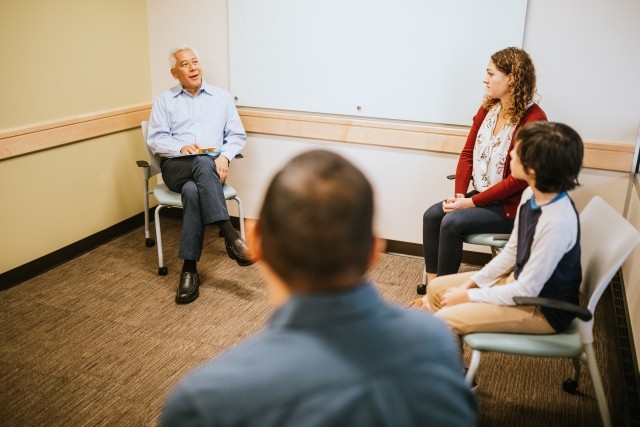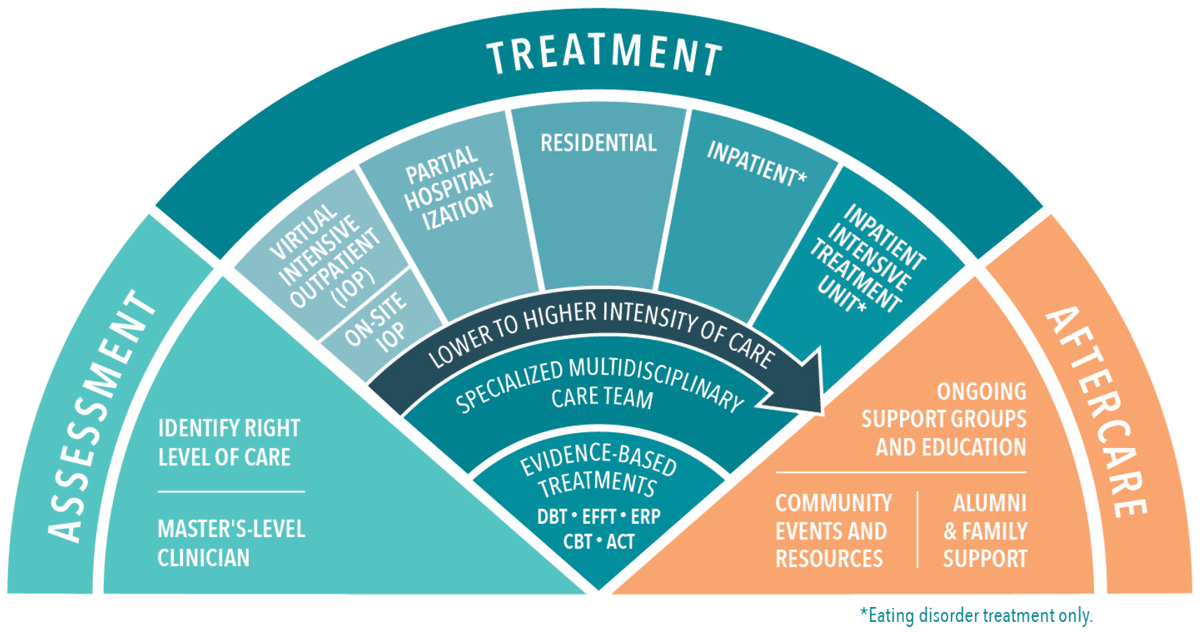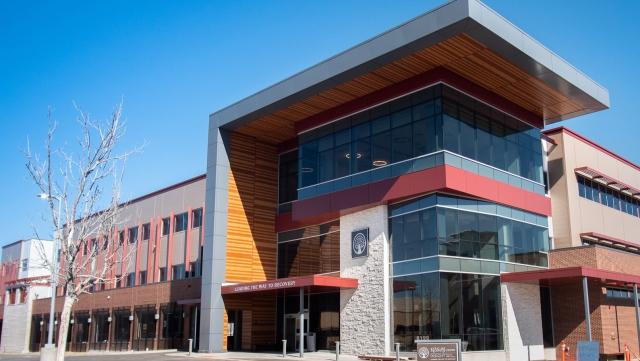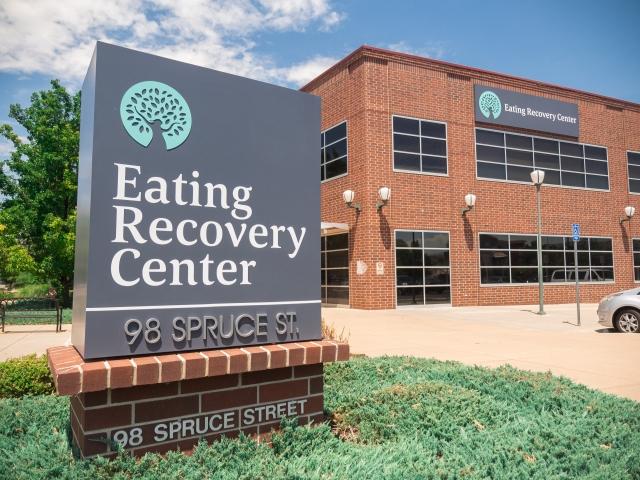What is residential eating disorder treatment like?
Eating Recovery Center’s (ERC) residential programs provide you with full-time support and care 24 hours a day, seven days a week in a highly structured environment.
Individuals in residential treatment do not require the intense medical support found in inpatient eating disorder treatment. But our residential care program still provides you with:
- 24/7 nursing supervision
- Full-time primary care and psychiatric support
- Nutrition and psychotherapy services
As patients live and connect with others in residential care, they gain new coping skills and start interrupting eating disorder thoughts and behaviors on their own.

Real People. Real Stories. Real Progress.
Our expert care teams ensure people of all ages, races and gender identities get the exact support they need at each stage of their recovery. With the right care, lasting healing is possible – and we have the data to show it.
73% of patients no longer reported significant eating disorder symptoms
Residential eating disorder treatment at ERC includes:
- 24/7 medical support provided by nurses and behavioral health techs
- Full-time primary care physician and psychiatrist on staff
- Access to local hospitals for urgent matters that can’t be handled on-site
- Regular contact with experienced registered dietitians and therapists specializing in eating disorders
- Eating disorder recovery skill building with individual therapy, interactive group sessions, passes and outings
- Daily, individualized meal planning, nutritional support and education
- Weight-inclusive, trauma-informed and gender-affirming care and LGBTQIA+ and BIPOC support
- The ability to meet complex medical and nutritional needs (our centers can utilize tube feeding support if that is what you need to recover)
- Evidence-based eating disorder therapies, including acceptance and commitment therapy (ACT), dialectical behavior therapy (DBT), cognitive behavioral therapy (CBT), emotion-focused family therapy (EFFT) and more
- Family programming, family meals, group therapy and free ongoing support groups for caregivers
Find Recovery with Evidence-Based Therapies

Child & adolescent residential programs
In our residential eating disorder treatment centers, children and teens ages 8-17* test their recovery skills both on-site and in the real world, during supervised activity and meal outings.
The treatment team works closely with our young patients and their caregivers, focusing one on one and in small groups to help them:
- Develop new skills
- Make progress in recovery
- Step down to a lower level of care when ready
Our treatment centers for children and adolescents are intentionally designed to be age-appropriate and kid-friendly spaces.
*Ages vary by location.
Consistent care for young patients
Our residential treatment programs are based on two of the most effective eating disorder therapies for young patients:
We empower caregivers to be the agents of change for their loved ones until they are able to manage meal planning, meal preparation, emotion regulation and other skills on their own.
Caregivers take part in nutrition education and family therapy, joining their loved ones for supported meals both on- and off-site.
Educational support for students
We recognize the high importance many families place on education and are committed to helping each of our school-age patients stay up to date with their academics while they are in treatment.
We offer up to three hours a day of dedicated time Monday through Friday in an on-site classroom setting to help your loved one complete their school assignments.
Our experienced educational specialists are here to help make the transition from school to treatment -- and back to school -- smooth and worry-free. Learn more about educational support services below.

Adult residential programs
Explore a path to healing as unique as you are. In adult residential eating disorder treatment, you’ll engage in individual, group and family therapy, providing:
- Evidence-based therapies with education on relapse prevention
- Nutrition counseling, education, meal planning and preparation
- New recovery skills for real-world situations
Join peers on meal and activity outings and enjoy the freedom of day and weekend passes. We welcome people of all genders, cultures, ethnic backgrounds, body shapes and sizes, and lived experiences.

Free, ongoing education & support for caregivers
Family and caregiver involvement is critical to supporting a loved one in eating disorder recovery.
In treatment, we work closely with parents and caregivers to teach you everything you will need to know to support your loved one’s recovery.
You'll find a strong caregiver support community at ERC, with multiple ongoing events dedicated to supporting families and caregivers, including:
- Ongoing free virtual caregiver support groups
- Virtual Family & Friends Education Series
- Hope Orientation
- Eating Disorders 101
- Weekly family therapy sessions
- Weekly nutrition education sessions with registered dietitians to discuss meal planning and your loved one’s progress

Aftercare support
Once treatment ends, our community outreach team will keep you and your family connected and supported with the tools you need.
We will follow up with you after you leave treatment with periodic phone calls, emails and invitations to our many eating disorder recovery resources, including:
Why Choose ERC?
Think of ERC’s continuum of care as a “golden thread” providing you with smooth transitions and consistency throughout treatment. ERC’s continuum of care team has been intentionally and carefully trained to:
- Get to know who you are as a whole person
- Provide consistent support that moves with you
- Reduce the risk of relapse during treatment
- Eliminate your stress in having to tell your story again and again
- Ensure access to medical and psychiatric experts in the eating disorders field
- Offer education and support to families and caregivers
- Increase the likelihood of insurance approving or extending your care
- Make sure that you have access to ongoing education, events and support groups after discharge
- Create seamless transitions with each level of care change
- Ensure uninterrupted connections with school (for child and adolescent patients)

Our continuum of care model ensures that you will be connected with the right support at the right time, from the initial assessment all the way through to aftercare.
When is residential treatment necessary?
... and how do you know if ERC's residential program is right for you?
Residential treatment at ERC offers 24-hour registered nursing care in a licensed psychiatric facility staffed by full-time primary care physicians and psychiatrists.
This structured, contained and individualized approach to treatment incorporates proven, evidence-based eating disorder therapies led by experts in the field.
In residential treatment, you will:
- Learn how to create a peaceful relationship with food and your body
- Discover skills to help you align your actions with your values
- Reprioritize food as one of the many important parts of your life
- Build and sustain a life that gives you meaning and purpose
- Meet and engage with peers who understand your struggle, uniquely relate to what you are going through and share a healing connection with you
Thousands of people have found healing within our programs, and so can you. It only takes one phone call to get started.
"Our mission is to provide the best possible care for our patients. Every day we work toward this goal: to take the very best care of individuals with eating disorders. Based on each patient’s unique needs, our treatment team will develop a customized, evidence-based treatment plan using approaches drawing from family-based treatment, emotion-focused family therapy, and other therapy modalities. Our goal is to meet patients and families where they are at.”
Get matched with the exact support you need.
With one conversation, our mental health professionals will help you better understand what you’re going through and what you need.
We will meet you where you are, listen to your story in a therapeutic setting, and match you with the level of support that meets your struggle.
Conditions We Treat
-

Eating Disorders
An eating disorder is a treatable mental illness that includes a number of different symptoms, including extreme emotions, attitudes, and behaviors surrounding weight and food issues.
-

Anorexia
Anorexia nervosa is characterized by an obsessive fear of weight gain and a refusal to maintain a healthy body weight.
-

Atypical Anorexia
You can’t tell if someone has an eating disorder just by looking at them. See how atypical anorexia affects people in a variety of body shapes and sizes.
-

ARFID
ARFID is a lesser known eating disorder that frequently begins as early as infancy or childhood, but adults can also suffer.
-

Binge Eating Disorder
Binge eating disorder is characterized by frequent overeating – at least once a week for three months – combined with a lack of control, intense feelings of distress and several other characteristic behaviors.
-

Bulimia
Bulimia is characterized by patterns of bingeing and purging.
-

Compulsive Overeating
Compulsive overeating can involve binge eating and weight gain, but it can also involve other behaviors.
-

Diabulimia
The term diabulimia is used to describe the diagnosis of an eating disorder in an individual with type 1 diabetes. These patients intentionally misuse insulin for weight control.
-

OSFED
Some eating disorders do not meet all of the diagnostic criteria for specific diagnoses like anorexia nervosa and bulimia nervosa.
-

Orthorexia
Some people go to extremes to “eat clean” at all times. This may lead to a disordered eating pattern known as orthorexia.
View all Levels of Care
-

Inpatient
Our Inpatient programming is designed to support adults, children and adolescents of all genders who are acutely ill and are experiencing medical and mood instability as a result of their eating disorder.
-

Residential
Within ERC Pathlight's step-down model of care, the Residential eating disorder treatment program as well as the Residential mood & anxiety treatment program offer medically stable patients a highly-structured and supportive 24-hour treatment environment.
-

Partial Hospitalization
Our Partial Hospitalization Program (PHP) offers some of the same intensity and structure of Residential mood, anxiety, and eating disorder treatment while providing additional opportunities to practice recovery outside of the controlled eating disorder treatment environment during evenings at home or in peer-supported apartment communities.
-

On-Site Intensive Outpatient Treatment
Our Intensive Outpatient program is a flexible mood, anxiety, and eating disorder treatment program that allows patients to work, go to school, or care for children during the day and sleep at home at night.
-

Virtual Intensive Outpatient - Eating Recovery At Home
ERC is removing the barriers that can keep patients with anorexia, bulimia, and other eating disorders from receiving treatment. Through telebehavioral health programming, Eating Recovery At Home (our virtual Intensive Outpatient Program) offers the same proven care as our in-person treatment centers.
Hide Last Child Layout Div










